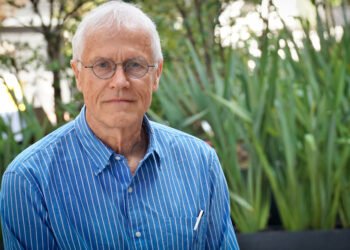What if one person could bridge the worlds of cutting-edge technology, social impact, and constitutional principles? Meet the visionary leader making this happen.
Sheldon Gilbert stands as a remarkable figure across multiple domains. As founder and CEO of Proclivity Media, he pioneered predictive advertising technology. His journey from molecular genetics to tech entrepreneurship demonstrates exceptional adaptability.
In 2020, he established Kura Labs, a non-profit tech academy with a powerful mission. The organization trains students from underserved communities for careers in AI infrastructure, cybersecurity, and edge computing.
In just four years, Kura Labs has achieved impressive results. Nearly 100 engineers have been placed at leading companies like NASDAQ, Morgan Stanley, AWS, and Bloomberg. These placements have generated over $18 million in new wages for graduates.
Beyond technology, Gilbert will assume presidency of the Federalist Society in January 2025. His commitment to judicial principles and the rule of law completes his multifaceted leadership profile.
Key Takeaways
- Sheldon Gilbert leads multiple organizations across technology and legal sectors
- Founded Kura Labs in 2020 to provide tech training in underserved communities
- Kura Labs has placed nearly 100 engineers at top companies in four years
- The program has generated over $18 million in new wages for graduates
- Gilbert will become President of the Federalist Society in January 2025
- His work demonstrates how technology and social impact can intersect
- Shows commitment to both innovation and constitutional principles
Introduction to Sheldon Gilbert’s Multifaceted Career
Beginning with molecular genetics research, Sheldon Gilbert’s professional evolution spans multiple disciplines. His journey showcases how diverse expertise can drive innovation across different fields.

From Molecular Genetics to Tech Entrepreneurship
Sheldon Gilbert built his foundation at Yale University, studying molecular genetics. He conducted advanced research at prestigious institutions like The Rockefeller University.
In the early 2000s, he made a significant career shift. He moved from laboratory science to technology, joining Fort Point Partners.
There, he helped build e-commerce systems for major retailers. These included J.Crew, Best Buy, and Nike.
Founding Proclivity Media and Predictive Advertising Innovations
His role as Director of Business Intelligence at Bluefly.com followed. This position focused on data analytics and understanding consumer intent.
This experience led to founding Proclivity Media. The company pioneered predictive advertising through Consumer Valuation Marketing.
Gilbert secured several patents in predictive analytics. His innovations significantly advanced computational advertising technology.
Educational Background and Early Career Transitions
His educational journey shows commitment to both science and business. He deferred graduate studies in bioinformatics to focus on entrepreneurship.
This decision marked a turning point in his career generation. It demonstrated his willingness to pursue innovation over traditional paths.
Over the years, his diverse background proved valuable. It allowed him to approach technology problems with unique perspectives.
This time in his career established patterns that would continue. His ability to bridge different disciplines became a lasting strength.
Sheldon Gilbert’s Transformative Leadership at Kura Labs
When tech innovation meets social purpose, remarkable transformations occur. The founder’s vision for Kura Labs represents this powerful combination perfectly.
Establishing Kura Labs: Mission and Vision for Underserved Communities
Kura Labs launched in 2020 with a clear dual mission. It addresses critical workforce shortages in cloud engineering.
Simultaneously, it creates pathways for economic mobility. The program specifically targets under-resourced communities.
This initiative reflects deep understanding of both technology and social needs. It demonstrates how strategic vision can drive meaningful change.
AI Training Programs and Workforce Development Initiatives
The curriculum focuses on three high-demand technical areas. AI Infrastructure Computing prepares students for cloud-based AI systems.
Cybersecurity training addresses growing digital protection needs. Edge Computing covers distributed network architectures.
These programs align directly with industry requirements. Graduates gain skills that companies urgently need.
This approach ensures both student success and employer satisfaction. It creates a sustainable model for workforce development.
Measurable Impact: Placements and Economic Mobility Outcomes
The results speak powerfully about the program’s effectiveness. Nearly 100 engineers have secured positions at leading firms.
Placements include major financial and technology companies. NASDAQ, Morgan Stanley, AWS, and Bloomberg have hired graduates.
These opportunities generate substantial economic impact. Over $18 million in new wages has entered communities.
This financial transformation changes lives and neighborhoods. It demonstrates how tech education can drive upward mobility.
Strong foundation support has been crucial for growth. Major technology partners and foundations recognize the program’s value.
This backing ensures stability and future expansion possibilities. The model shows how ethical AI integration benefits everyone.
Responsible innovation remains central to the organization’s philosophy. It balances technological advancement with social responsibility.
Transition to Federalist Society Presidency
Selecting new leadership requires careful consideration of both philosophical alignment and practical experience. The Federalist Society conducted an extensive search process to identify the ideal candidate for this crucial role.

Appointment Process and Search Committee Selection
The search committee played a vital role in the selection process. This group included distinguished legal figures like former Attorney General Ed Meese.
Their thorough evaluation ensured the right candidate emerged. The committee considered numerous qualified individuals before making their final recommendation.
This meticulous approach guaranteed the best possible choice for the organization. The process reflected the seriousness of the leadership transition.
Legal Philosophy and Commitment to Judicial Principles
The new president brings a strong originalist perspective to the role. This philosophy emphasizes interpreting laws based on their original meaning.
Commitment to the rule of law forms the foundation of this approach. Separation of powers remains another crucial principle in this legal framework.
These judicial principles guide the organization’s mission and activities. They represent core values that shape every decision and initiative.
Board Support and Future Direction for the Organization
The Board of Directors expressed unanimous support for this appointment. This includes backing from the organization’s co-founders and longstanding members.
This broad approval signals confidence in the leadership transition. It demonstrates organizational unity moving forward.
Future plans include growing membership and expanding outreach efforts. The organization aims to reach new generations of legal professionals.
These initiatives will strengthen the group’s impact across the legal community. They represent strategic priorities for the coming years.
The incoming leader brings sixteen years of private sector experience to this role. This includes work with major organizations like the Chamber of Commerce litigation team and Walmart’s legal department.
Previous roles at the Institute for Justice and National Constitution Center provided additional valuable experience. These positions developed expertise in constitutional matters and public interest law.
Even during law school, dedication to legal issues was evident. The creation of a national religious liberties moot court demonstrated early commitment to important legal principles.
This comprehensive background prepares the new president for the challenges ahead. It combines practical experience with deep philosophical understanding.
Conclusion: Sheldon Gilbert’s Enduring Legacy and Future Impact
Sheldon Gilbert’s career demonstrates exceptional versatility across technology, education, and law. His work creates meaningful change through innovation and opportunity.
As CEO of Kura Labs, he built pathways to tech careers for underserved communities. The organization’s success shows how education transforms lives and strengthens industries.
His upcoming Federalist Society leadership will shape legal discussions for years. This role continues his commitment to constitutional principles and judicial philosophy.
Gilbert’s influence extends across multiple sectors with lasting effect. His vision provides strong support for the next generation of professionals.
Looking toward the future, his work continues to drive progress. The coming time will likely bring even greater impact from his multifaceted leadership approach.
FAQ
What is Sheldon Gilbert’s background before joining Kura Labs?
Sheldon Gilbert has a diverse career spanning molecular genetics, tech entrepreneurship, and predictive advertising. He founded Proclivity Media, focusing on innovative ad tech solutions, and transitioned from scientific research to business leadership.
How did Kura Labs begin, and what is its mission?
Kura Labs was established to provide AI training and workforce development for underserved communities. Its mission centers on creating economic mobility through tech education and measurable job placements.
What led to Sheldon Gilbert’s appointment as Federalist Society president?
A search committee selected Sheldon Gilbert based on his leadership experience and commitment to legal principles. The board of directors supported his vision for the organization’s future direction.
What impact has Kura Labs achieved under his guidance?
Kura Labs has successfully placed graduates in tech roles, demonstrating strong outcomes in workforce development and economic advancement for participants.
How does Sheldon Gilbert’s legal philosophy align with the Federalist Society?
His approach emphasizes judicial principles and originalist interpretation, aligning with the organization’s long-standing dedication to these values.





